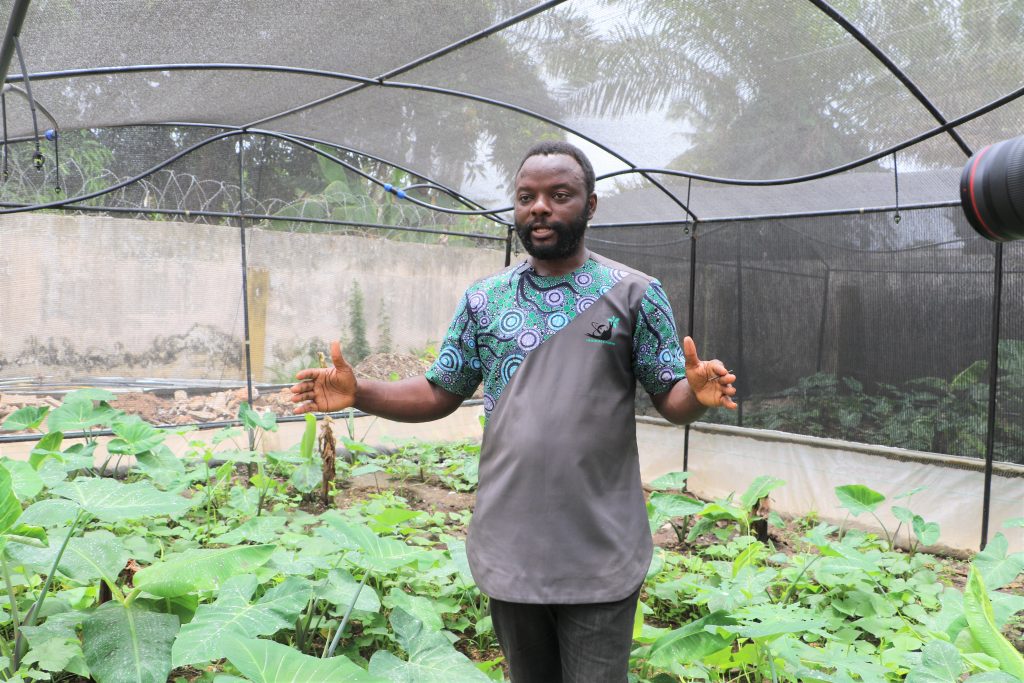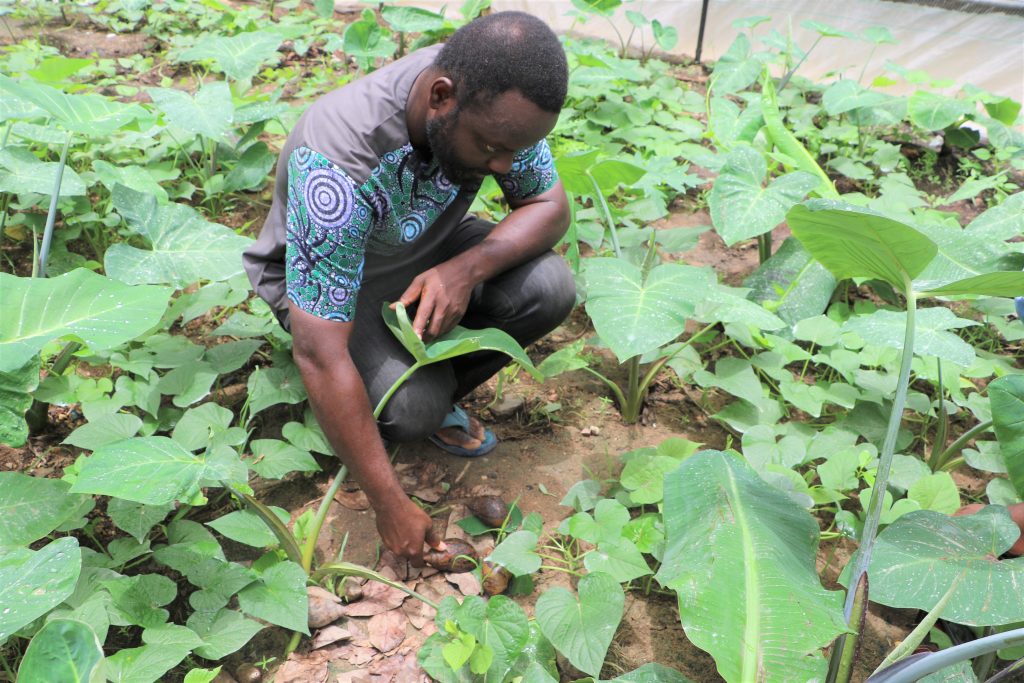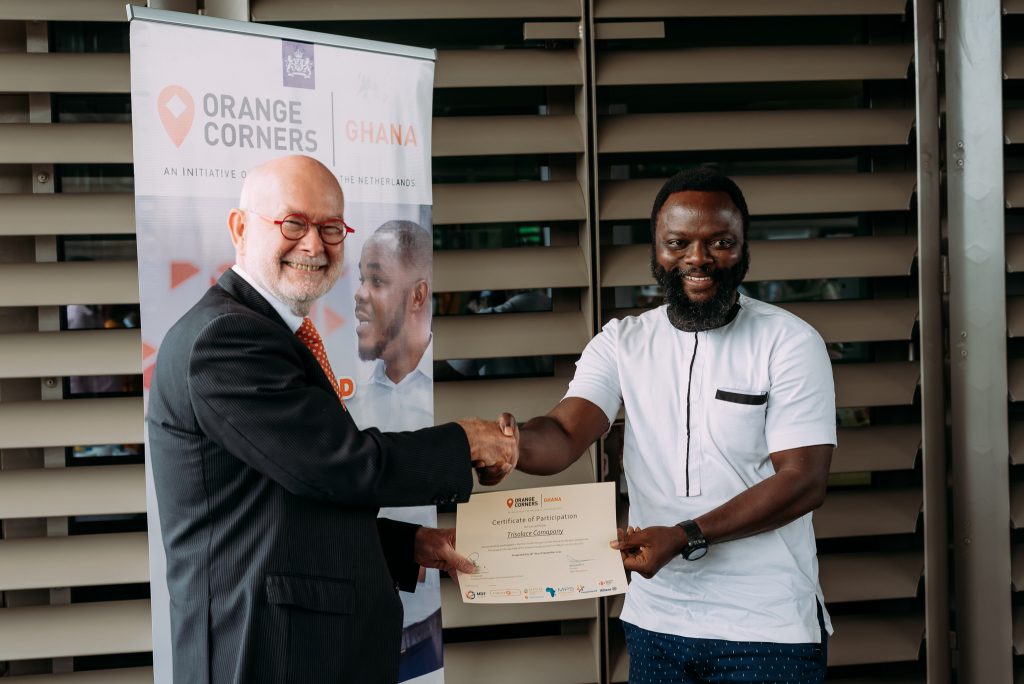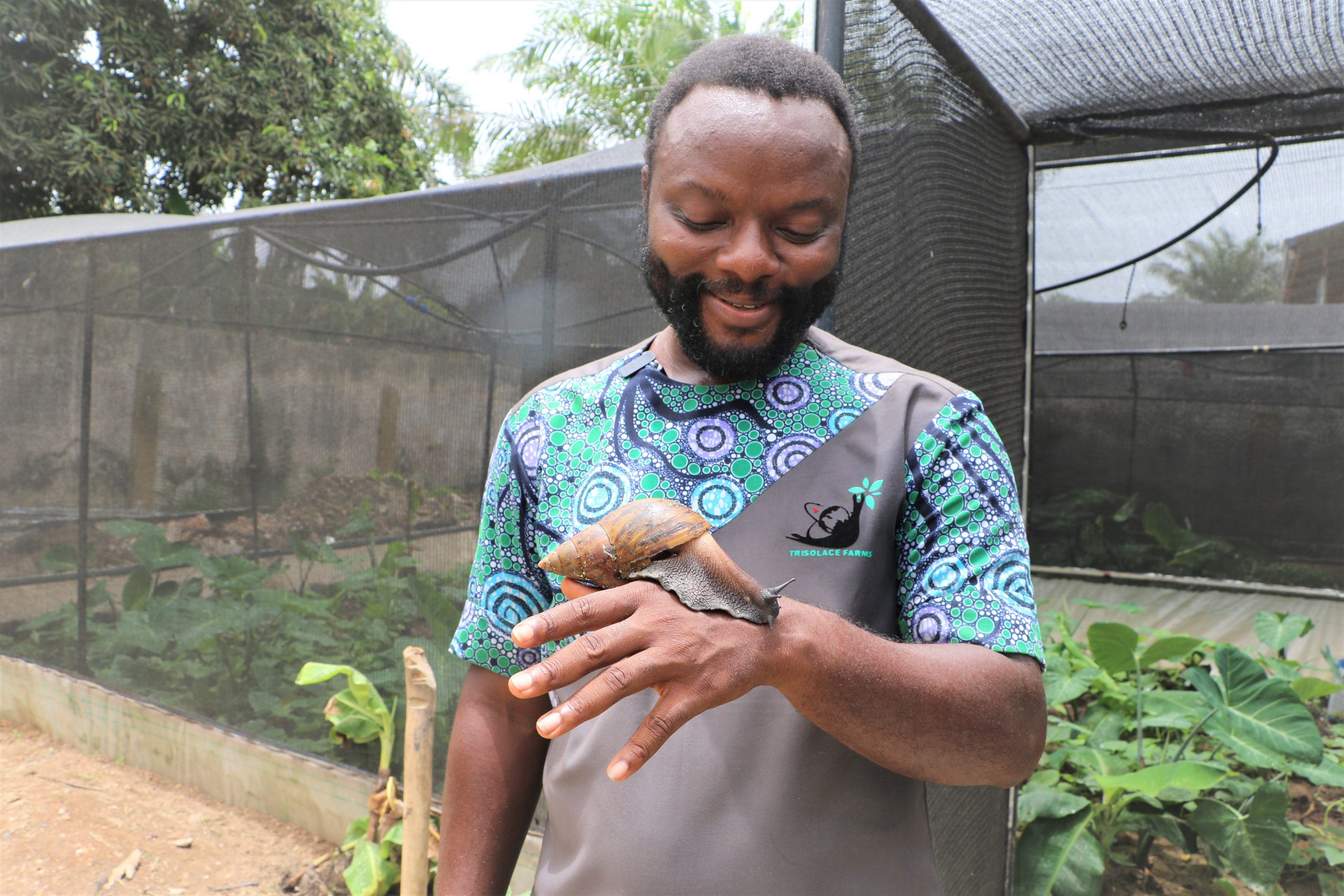Did you know snails are the most profitable farm animal per square meter? Although few Dutchies are sold on the idea of eating snails yet, Orange Corners Ghana alumni Felix and his Trisolace team know that the future of farming is in snails. Our travelling reporter spoke to Felix at the West Africa Deal Summit, where he was part of the mixed Ghanaian-Nigerian delegation of promising Orange Corners entrepreneurs pitching to high-level investors in the DealRooms.
Hi Felix, thanks for making the time to talk to us! Could you quickly introduce yourself: who are you and what do you do?
Felix: my name is Felix Appiah of Trisolace Company Limited. I’m a civil engineer with degrees in civil engineering and computer programming, but I’m also a bona fide farmer.
Back in 2015, I realised there were a lot of contracts available on the open market, but there wasn’t anyone locally to fill those contracts. People simply didn’t have enough capital to start bigger farms. And they didn’t have the knowledge base for commercial farming. So we said “why don’t we take these big contracts – like 20 tonnes of snails, 20 tonnes of pepper – and then divide it into smaller sections for people to fulfil that? Then we can buy back, form a larger party and then offset it, either export or sell it locally”. So that’s what we did with snails. So one client needed about 20 tonnes for the whole year, we signed the contract and said that we would source them for her.
Instead of going to the villages, deforest and claim new land, we take advantage of existing urban spaces.
Felix Appiah, Trisolace
Back in the days we would only pick snails from the forest. But for it to be a business, for it to be sustainable, there had to be an ecosystem. So we designed a new type of greenhouse. A structure to raise them in that is eco-friendly, easy to use, doesn’t deform existing places and doesn’t retain too much heat. We use shade nets for example, they reduce the sun’s intensity by 40%. And was also semi-automated, so that it’s not too labour-intensive. When you turn on one lever, it’s raining inside the whole greenhouse. So that’s how we started. Now we provide an end-to-end system which is fully automated if you want it to.
Instead of going to the villages, deforest and claim new land, we take advantage of existing urban spaces. A typical Ghanaian house in an urban centre like Accra has a leftover space of about five square meters. So we made that our standard size greenhouse, although we also sell larger versions. It looks like a regular greenhouse for vegetables, only it’s made of black nets and it has sprinklers on top. The standard size is suitable for about 600 snails.

Why snails?
Snails are actually the most profitable farm animals per square meter! You can crop them in a small space and they’ll still be able to reproduce and make a lot of money for you. Interesting fact: snails are one of the few farm animals with both male and female sex organs. And they can save bodily fluid up to a year. So even when the environment is not conductive, they still reproduce. Also, they don’t smell and neither do they make noise, so you can raise them in urban settings and people won’t call the city inspectors on you or anything!
After school, I saw a lot of young people fighting for the few jobs that were available. I wanted to do something that benefitted these young people, that wouldn’t be too expensive for them and that they could make their own. Back in the days, snails sustained a lot of families as an alternative (and free!) source of protein, it prevented malnutrition. You could go to your backyard and get snails to use in your soups and sauces. People were getting by on eating snails, myself included. But as I was growing up, I saw that snails became really expensive and scarce. You couldn’t get them anywhere anymore, as the bushes around the cities disappeared
One day, I went to visit my grandpa in his village. He was a cocoa farmer. I saw that even in the dry season he had snails, which was unusual. So I asked him how does it. And he said “Oh, you just pour water at the back of your house. Give them leftover food and they keep on coming!” That easy.
So I studied under him for a while, looking at the circular ecosystem that he had developed. He’d give them leftover food, and he’d use the snails for meat and fecal matter.
Snails are the most profitable farm animals per square meter!
Felix Appiah
So smart! So you mentioned that here in Ghana you eat snails, but you produce all sorts of other products as well, right?
We do, yes! Nothing is wasted. Snails walk on slime, which contains a mucin suitable for anti-aging and scar treatment creams. It’s also used as a base for insulin-based products. And you can also use the shell. The shells are about 89% calcium, which makes it a good source of calcium for animal feed. We also use the intestines and other body parts as additional protein sources for animal feed. And their fecal matter is so rich in NPK, it can grow everything.

What does your business model look like?
We’re one of the few companies that fabricates snail greenhouses from scratch. We can do any size, any shape, any colour people want. We also sell materials, such as shade nets, sprinklers for irrigation and such. And live snails, either to eat or as breeding stock to start a snail farm. And we also sell packaged snails to hotels and restaurants, we export live and frozen snails to the UK, and we sell shell-based animal feed for fish, rabbits, chicken, sheep etc. And then we do consultancy. People pay us to com help them set up snail farms or irrigation. We also have a project coming out called Aggregates.farm, which is our online platform which will train people in snail farming, mushrooms, beekeeping, vegetable farming and more from the comfort of their homes.
You’re here at the West Africa Deal Summit today because you’re looking to scale. What are your hopes and expectations for this summit?
I’m looking for partnerships. It’s a bit of a lonely stretch as an entrepreneur where you have a lot of plans in your mind, so I’m looking at partnering with other entrepreneurs with like-minded ideas. So we can take our businesses to another level together.
We’re also looking for funding to scale. Currently we have feed production units that do about 10 tonnes in a day. And we’re looking at getting funding to build a big warehouse so we can produce even more feed. Currently we import the feed for fish and rabbits, which is quite expensive. But we can take advantage of the market by reducing our cost slightly if we don’t import or pay so much duties, but produce feed locally.
And we’re also looking for research partners. When it comes to snails we’ve done a lot of research but there’s still a lot of grey areas when it comes to diseases, how to speed up their growth, how reproduction works and topics like that. It’s the same for other animals, such as rabbits.

So that’s your short-term plan. When you look ahead, let’s say 5 or 10 years, like where do you see yourself going?
We hope to become a household name for alternative protein. Snails recycle household waste, making sure that garbage doesn’t end up on the landfill. They will eat garbage and turn it in good meat. Good meat which doesn’t contain a lot of fat, which is also what people are looking for today. We’re also looking to become a giant in the sustainable animal feed production by using leftovers such as snail shells. And we’d like to employ more youth, because every greenhouse we build employs one person directly and about three women indirectly – the ones selling the live and frozen snails or the animal feed. Finally, we’re looking to become a research centre. Once we set up our own facility, we can help other farmers get to know more about their sector for the benefit of everybody in Ghana and in Africa.
We hope to become a household name for alternative protein.
Felix Appiah
You just mentioned Africa. Are you looking to expand further internationally as well?
The French love snails, the Italians and Greeks do too. A lot of countries love snails, but not necessarily our type of snails. So we have a specific type that we’re growing for the export market, one that is smaller and has a different taste. I think they’re afraid of the size of the African snails – it’s as large as a phone handset! And we’re also looking at targeting snail slime – which is very expensive now – for anti-aging and pharmaceutical creams. And then we’re also looking at sending our animal feed not only to Ghana, but also to other parts of the world.
Awesome! So as we’re approaching the end of this interview, is there anything else you’d like our readers to take away?
Currently the market for alternative protein is booming, because people are moving away from cattle, sheep and goat meat because they’re poor converters of feed. At Trisolace, we believe that the future is in edible insects, molluscs and crustaceans, including snails. Those are the animals that are going to feed the world, because they require very little space, very little labour and can recycle anything given to them in terms of household waste into meat. If we’re able to get funding and partnerships, we can employ more people, take advantage of urbanisation, save the forest and ensure that everyone involved in this ecosystem can make a positive impact on Africa and the world.
Follow Felix & Trisolace online:
Website
Facebook
Instagram
LinkedIn
YouTube





